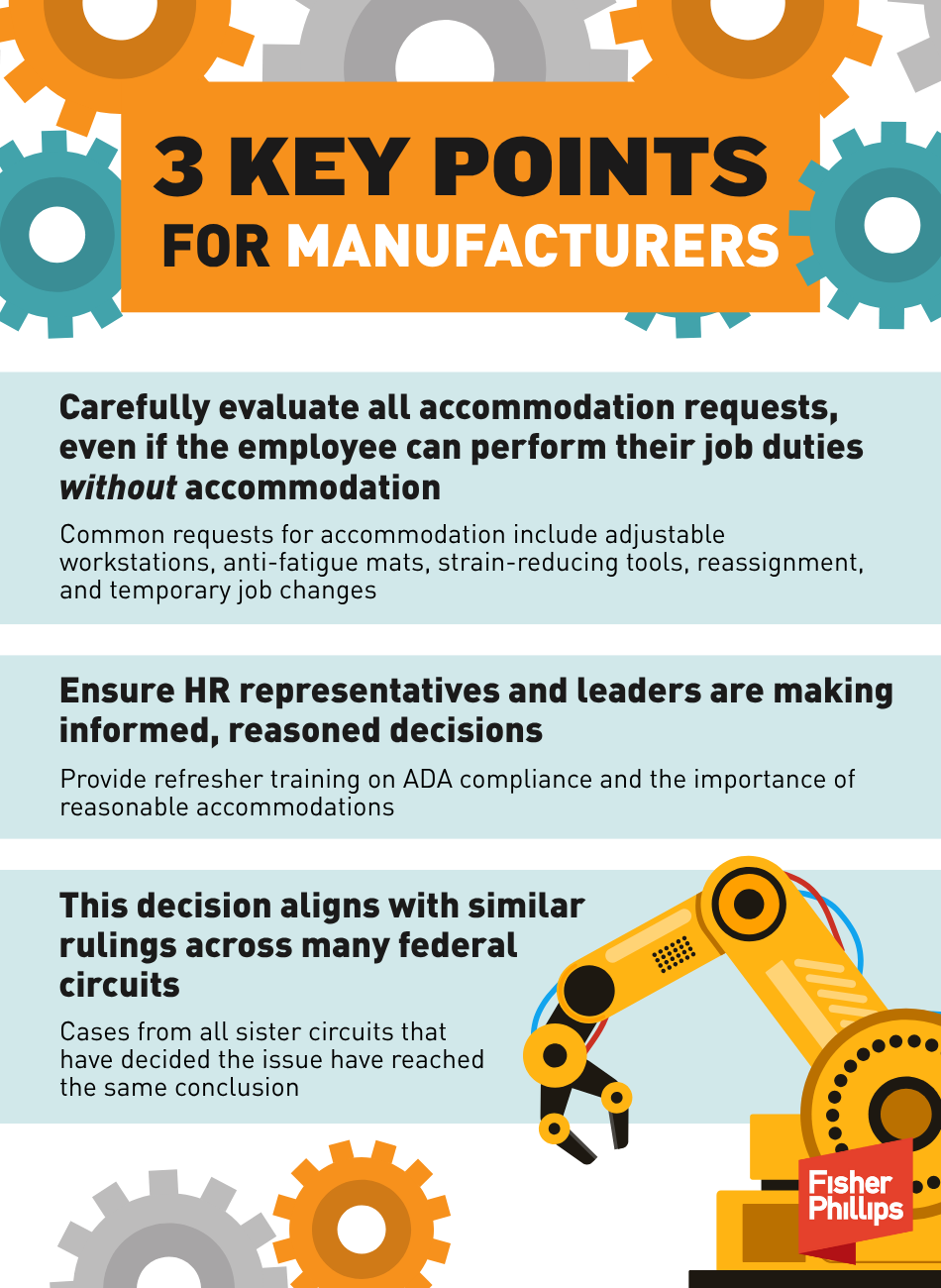FP Snapshot for Manufacturers: 3 Things Employers Need to Know About ADA Accommodations After Federal Appeals Court Ruling
Insights
6.17.25
Welcome to this edition of the FP Snapshot on Manufacturing Industry, where we take a quick snapshot look at a recent significant workplace law development with an emphasis on how it impacts employers in the manufacturing industry. This edition is devoted to critical points manufacturing employers should consider regarding requests for ADA accommodations in light of a recent federal appeals court decision that reinforced the broad nature of the law.
Snapshot Look at the Recent Federal Court Ruling
In Tudor v. Whitehall Central School District, the federal appeals court recently clarified that an employee may qualify for a reasonable accommodation under the Americans with Disabilities Act (ADA) even if they can perform essential job functions without such an accommodation. This decision reinforces that the employee’s ability to perform essential job functions is relevant but not decisive in ADA failure-to-accommodate claims. In particular, the court emphasized that requiring an accommodation be strictly necessary to be considered “reasonable” would contradict the purpose of the ADA. For a deeper dive into the situation, you can read our full Insight here.
What 3 Things Do Manufacturers Need to Know?
There are three key points that manufacturers should consider in light of this ruling.
1. Manufacturers must carefully evaluate all accommodation requests, even if the employee can perform their job duties without the accommodation. As most jobs on the manufacturing floor involve strenuous activity, common requests for accommodation include adjustable workstations, anti-fatigue mats, tools designed to reduce strain, reassignment to less physically demanding tasks, and/or temporary changes in job responsibilities, among others. Manufacturers should assess each accommodation request individually, considering the employee’s specific needs and the potential impact on operations.
2. Manufacturers must ensure HR representatives and leaders are making informed, reasoned decisions in compliance with applicable laws. Consider providing refresher training on ADA compliance and the importance of reasonable accommodations that incorporates and addresses typical manufacturing workplace conditions to your HR representatives and management teams, including the importance of maintaining detailed records of accommodation requests, evaluations, and decisions to demonstrate compliance with ADA requirements.
3. Manufacturers across the country should take note as this decision aligns with similar rulings across many federal circuits. While Tudor v. Whitehall Central School District covers employers in the 2nd Circuit’s jurisdiction, the appeals court noted that this decision was not novel. In fact, cases from all sister circuits that have decided the issue have reached the same conclusion – the ability to perform essential job functions without an accommodation is not fatal to an employee’s ADA or Rehabilitation Act failure-to-accommodate claim. These sister circuits include:
- 1st Circuit: Massachusetts, Maine, New Hampshire, Rhode Island
- 2nd Circuit: New York, Connecticut, Vermont
- 5th Circuit: Texas, Louisiana, Mississippi
- 6th Circuit: Ohio, Michigan, Kentucky, Tennessee
- 8th Circuit: Missouri, Arkansas, Iowa, Minnesota, Nebraska, North Dakota, South Dakota
- 9th Circuit: California, Washington, Oregon, Arizona, Idaho, Nevada, Montana, Alaska, Hawaii
- 10th Circuit: Colorado, Kansas, New Mexico, Oklahoma, Utah, Wyoming
- 11th Circuit: Georgia, Florida, Alabama
- D.C. Circuit: District of Columbia
In other words, the above considerations are particularly important if your facilities and operations are located in these jurisdictions. Moreover, state law might also offer broad interpretations for disability accommodation law, as the standards for disability discrimination claims are often more lenient under state or local human rights laws.
Want More?
We will continue monitoring workplace law developments, so make sure you are subscribed to Fisher Phillips’ Insight System to have the most up-to-date information sent directly to your inbox. If you have questions, contact your Fisher Phillips attorney, the authors of this Insight, or any attorney on our Manufacturing Industry Team.
Related People
-
- Chase Dorn
- Associate
-
- Nicole Golob
- Regional Managing Partner


